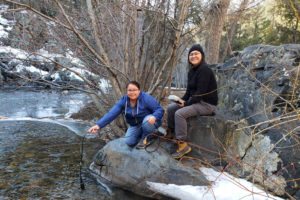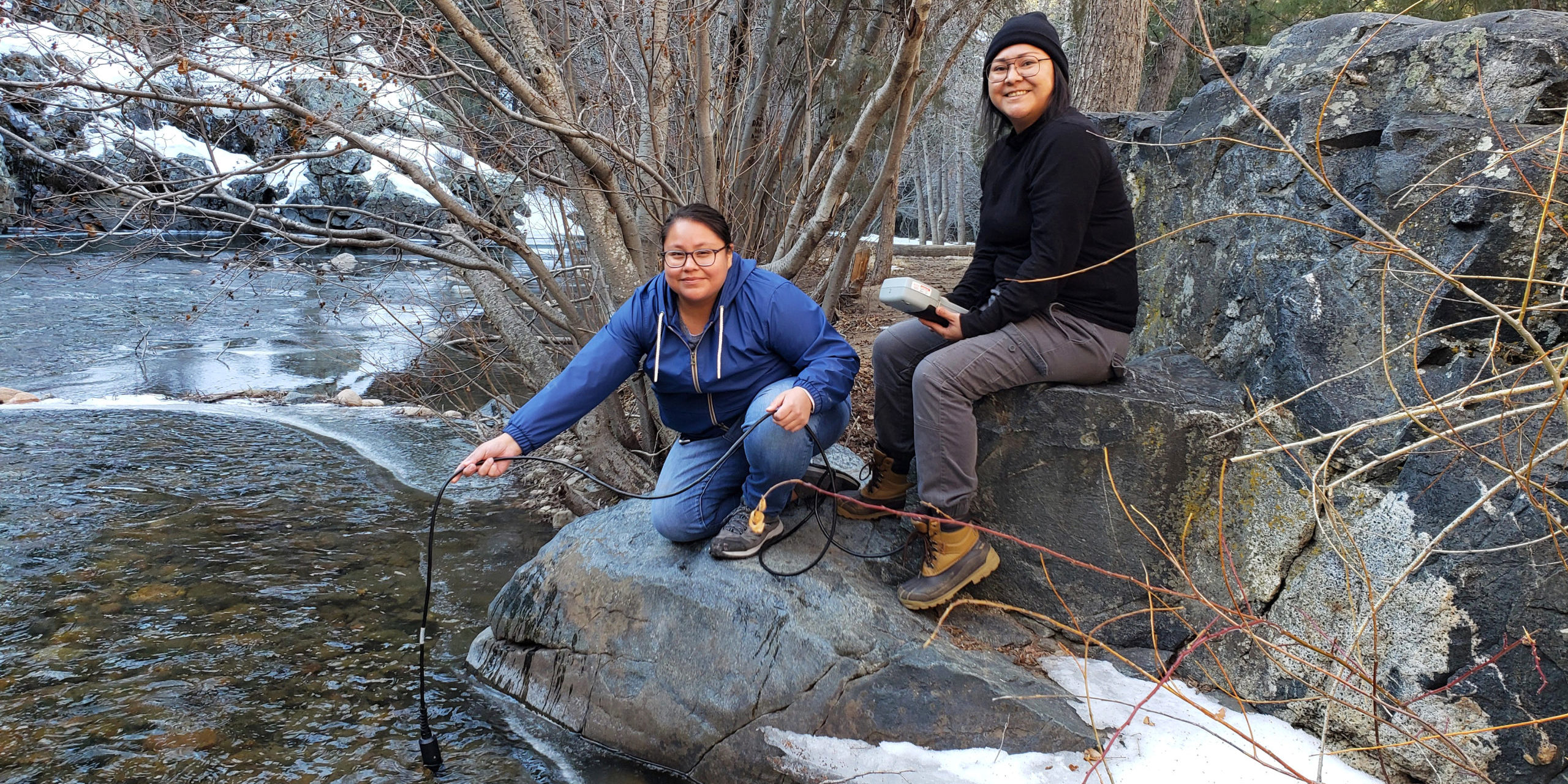July 22, 2020

Courtesy Photo: Jennifer Lindline/Highlands University
Highlands geology students Megan Begay, left, and Letisha Mailboy conduct water quality field research at the Upper Pecos River.
Las Vegas, N.M. – Two New Mexico Highlands University geology students will work as a team to study water quality in the Upper Pecos River with the goal of protecting the watershed, thanks to grants from the New Mexico Water Resources Research Institute.
Letisha Mailboy and Megan Begay, both geology seniors, each received $7,100 grants from the research institute. Their research began in June 2020 and continues through May 2021.
“The main purpose of my research is to identify degradation sources of the Upper Pecos River,” Mailboy said. “By identifying the naturally occurring chemical reactions and introduction of human activity pollution, proactive watershed protection plans can be developed and implemented.”
Mailboy will monitor the environmental chemistry of the Upper Pecos River along 15.5 miles between the Terroro Mine Site and the East Pecos Village.
Mailboy said her Navajo, or Diné, heritage influenced her decision to study the water quality in the Upper Pecos River. She is from the Canoncito band of Navajos in To’Hajiilee, New Mexico.
“My Diné traditions and culture connect me to New Mexico history and the land wherever that might be. My research pays homage and respect to the ancestral territories of the Tanoan tribes that include the Northern Tiwa Pueblos, the Apache and the Comanche people,” Mailboy said.
Looking ahead, Mailboy said her professional goal is to work with the Navajo Nation Abandoned Mine Lands program to help close, safeguard and remediate abandoned mine sites that plague the Navajo Nation people and resources.
“The main goal of my research is to assess the overall water quality conditions of the Upper Pecos River by establishing baseline level data,” said Begay, who is also Navajo. “This data will help assess the overall ecosystem of the watershed, including land usage from public and private lands that may be contributing factors in water quality degradation.”
Begay’s research will focus upon the same stretch of the Upper Pecos River as Mailboy’s research.
Begay said that as a Native American woman and mother, she wants to see water for future generations. She is from the Navajo Nation in Burntwater, Arizona.
“My Navajo heritage has influenced my desire to do this water quality research because I believe everyone is entitled to good water quality for agriculture, consumption and recreation. Water is life, a natural filter for everything, and since the Earth is limited in freshwater, it must be cherished,” Begay said.
Begay said she is interested in pursuing a career in environmental law.
Jennifer Lindline, a Highlands geology professor, is supervising both Mailboy and Begay in their research.
“Letisha and Megan’s Upper Pecos River monitoring work is vital to document the physical-chemical parameters of this high-quality cold-water fishery and precious community resource,” Lindline said. “These data are critical for stakeholders to be able to protect water quality where it is good and restore water quality where it falls short.”
Lindline said from her first interactions with Mailboy and Begay, she was impressed by their high level of academic responsibility and interest in opportunities outside of the classroom.
“I invited them to participate in this research because of their strong scholastic skills, as well as their sunny personalities and good humor. Most importantly, they each bring a strong set of scientific, creative, and analytical skills to the project,” Lindline.
“Dr Lindline is a wonderful mentor who has helped me overcome the challenges of gender and racial inequality within the science profession by teaming up with Megan and I on this project,” Mailboy said.
Begay said: “I would not trade Dr. Lindline for any other mentor in this chapter of my life. She is a strong woman who helps me develop my critical thinking and always brings awareness to my life with what she teaches me, especially with this research project.”
This work is supported by the Hispanic-Serving Institutions Education Grants Program Grant No. 2020-38422-32242 from the USDA National Institute of Food and Agriculture.

